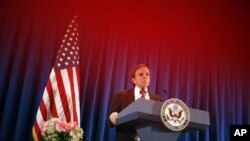A senior U.S. official says Washington is concerned about new human rights problems in China. His comments came at the end of two days of human rights talks with Chinese officials in Beijing.
Assistant Secretary of State Michael Posner says the talks were expansive and in depth, and that his delegation expressed rising U.S. concerns. He said Thursday the talks also included issues such as Internet freedom, religious freedom, Tibet, and Xinjiang
"In recent months, we've seen a serious backsliding on human rights, and a discussion of these negative trends dominated the human rights dialogue these past two days," said Posner. "We have been and are very concerned over recent months by reports that dozens of people, including public interest lawyers, writers, artists like Ai Weiwei, and others, have been arrested, detained, or in some cases, disappeared, with no regard to legal measures."
He says the U.S. raised many individual cases, including jailed Nobel Peace Prize winner Liu Xiaobo and his wife, Liu Xia, who has been detained even though she has not been charged with committing a crime.
Posner said Washington is especially concerned about the lawyers who have disappeared into police custody. They include Teng Biao, Cheng Guangcheng and Gao Zhisheng.
He also asked about well known artist and activist Ai Weiwei, who was taken into police custody earlier this month.
"What I would say is that on that case, we certainly did not get an answer that satisfied," added Posner. "There was no sense of comfort from the response, or the lack of response."
Chinese Foreign Ministry spokesman Hong Lei gave few details of the talks, but acknowledged that they were "candid and in depth." He repeated China's position that it will engage in such dialogue on the basis of equality and mutual respect.
He adds that at the same time, his government opposes the United States' use of the human rights issue as an excuse to interfere in China's internal affairs.
Amnesty International's Asia-Pacific director Sam says he thinks the talks demonstrate that the United States and other governments should continue to push human rights with China.
"I think the important thing at the moment is to understand that these talks really should be part of a process, and that having the talks in and of themselves doesn't just tick the box on human rights, and [then] you can have the US-China relationship just move along," said Zarifi.
He says Amnesty hopes that the human rights issue is not just limited to the annual discussions, but becomes part of a larger engagement process.
Rights will be on the agenda at high-level U.S.-China strategic and economic talks next month in Washington, although at that meeting, it will just be one among many other issues.
In recent months, China has ramped up efforts to contain dissent, and to block access to information about protests in other countries. Scores of government critics and rights activists have been detained, foreign journalists have faced new restrictions on their work, and access to hundreds of Internet news sites has been restricted.
Many rights activists and Asia political experts say the clampdown appears to be aimed at making sure the so-called Jasmine Revolution, which has brought political change and uprisings in the Middle East, does not take root in China.
US Says China Backsliding on Human Rights
- By Stephanie Ho




